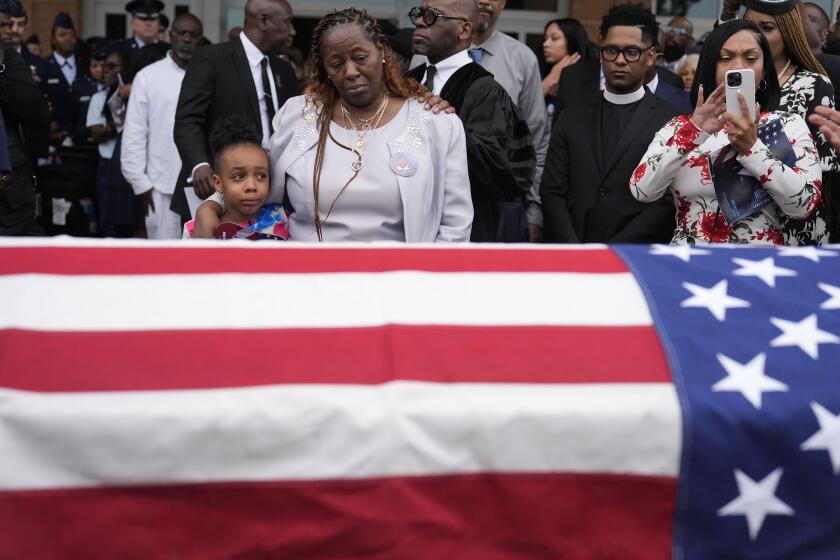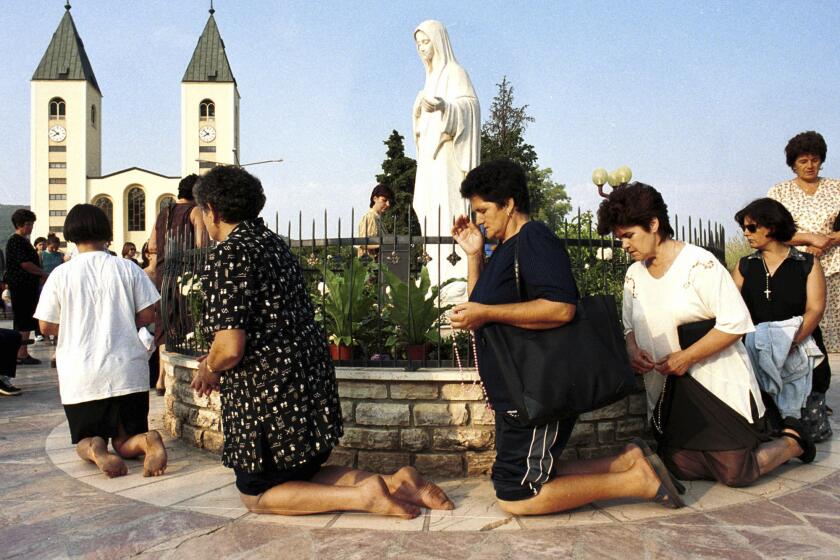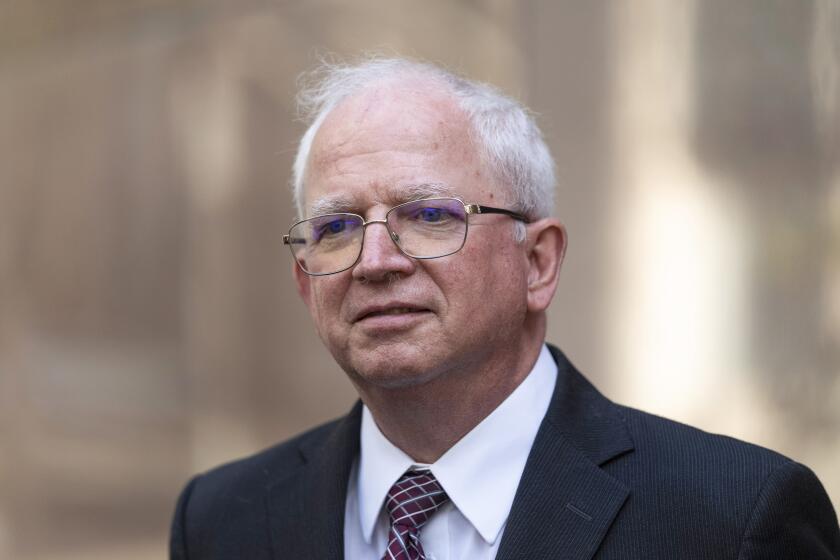Election Will Test Israelis’ Grip on West Bank
Israel’s national election Tuesday will serve as the clearest referendum yet on whether Israelis are willing to relinquish their hold on far-flung biblical sites like this settlement built where the Old Testament says the children of Israel divided their land according to lots.
The election front-runner, acting Prime Minister Ehud Olmert, has announced his intention to gather Jewish settlers into a few large blocks and give up remote communities where the dream once flourished of a “greater Israel” stretching from the Mediterranean Sea to the Jordan River.
With Prime Minister Ariel Sharon incapacitated by a massive stroke, Olmert has put forth an even more explicit blueprint of what the 78-year-old leader envisaged before being stricken: an Israel that lies largely within the armistice lines in place before the 1967 Mideast War.
Now, without the sheer force of Sharon’s personality to nudge them along, Israeli voters will determine whether this is truly the path the country has chosen.
Polling is an inexact science, as those living in this region were reminded when the militant group Hamas unexpectedly triumphed two months ago in Palestinian parliamentary elections.
But as political parties held their final rallies and broadcast eleventh-hour commercials Sunday -- the last full day for campaigning allowed by Israeli law -- all indicators continued to show Olmert’s centrist party, Kadima, holding a commanding lead over its nearest rivals.
Party strategists worried over signs of slippage, but remained confident Kadima would emerge from the elections with a victory.
Trailing behind are the left-leaning Labor Party, led by Amir Peretz; the conservative Likud Party that Sharon spurned in his last months of political life, now led by longtime rival Benjamin Netanyahu; and the resurgent Yisrael Beiteinu, led by Avigdor Lieberman, whose far-right ideology and appeal to immigrants from the former Soviet Union appear to be siphoning votes from Likud.
Although the campaign may have lacked a sense of suspense, the outcome has momentous ramifications for the future of the country and the conflict with the Palestinians.
Last summer, Israel withdrew from the Gaza Strip and a small swath of the West Bank. If Olmert is given a mandate in Tuesday’s election, he intends to evacuate tens of thousands of Jewish settlers from isolated communities in the West Bank. Olmert has said he hopes to establish Israel’s borders by 2010, reinforced by the security barrier it has been building over the last two years.
“Now we have a referendum for [the Gaza] evacuation and a further evacuation from the West Bank,” said Hillel Cohen, a scholar at the Harry S. Truman Institute for the Advancement of Peace at Hebrew University of Jerusalem. At stake, Cohen said, is “an ideology for what kind of Israel you want.”
In places such as Shiloh, perched on a rocky hilltop about 20 miles northeast of Jerusalem, the sense of betrayal runs deep, even before votes have been cast.
“I’m not just worried about my own home, I’m worried about our national home, the home of the Jewish people,” said Shevach Shtern, a 55-year-old building contractor who with his wife, Sara, raised seven children in this settlement of about 200 families.
“When Jews in exile dreamed of the Land of Israel, places like this -- the places from the Bible -- are the ones they dreamed of,” said Shtern, whose parents settled in Israel after surviving the Holocaust. “They didn’t dream of Tel Aviv. This is the promised land.”
But many ordinary Israelis feel only relief at the prospect of relinquishing the settlements, with their enormous financial costs and the military burden of defending Jewish communities whose inhabitants are outnumbered 10-1 by Palestinians in the West Bank. At the time of the Gaza withdrawal, polls showed that a majority of Israelis supported the move.
Commentators have noted the odd contrast between the tumultuous months leading up to the Gaza pullout and the relative sleepiness of the campaign.
“This is the first time that an incumbent prime minister is declaring his intention of dismantling dozens of settlements, and nothing is happening,” political commentator Aluf Benn observed in the Haaretz daily. “No demonstrations and protests, no rebellion within the party, and no media uproar.”
Everyone here is well aware, however, that the current calm is deceptive.
“This plan is fiercely controversial and, if the government pursues it, we are sure to have stormy years ahead, outbreaks of violent rebellion, vehement Palestinian resistance and tremendous costs that probably will not leave anything for our own welfare,” columnist Yaron London wrote in the Yediot Aharonot newspaper.
Hovering over the election proceedings is the still-vivid memory of Sharon, whose exit from political life will be symbolically ended by this vote.
It was he who single-handedly forced the realignment in Israeli politics when he bolted from Likud and formed Kadima by luring defectors from his former party and from Labor. For many Israelis, it is somewhat sad and eerie to see images of him everywhere -- gesturing vigorously in file footage used in TV ads, gazing out from billboards, looking bullishly determined -- while he lies hospitalized in a coma.
Some analysts have attributed Kadima’s lead in the polls in part to a Sharon effect: Voters who decided to join him in jumping to Kadima have stuck with the party out of loyalty to him, and a sense that their votes are a final gesture of respect for the old general.
“Kadima is still looked upon by many people at the grass roots as Sharon’s party, not as Olmert’s party,” said Gabriel Sheffer, a political science professor at Hebrew University. “The sympathy to vote Sharon is still affecting the party.”
The latest polls showed Kadima getting around 37 seats in the 120-member Knesset, or parliament, with Labor winning about 21 and Likud around 14.
The vote results will shape Kadima’s options for forming a ruling coalition and setting the government’s course of action toward the Palestinians, including withdrawals from the West Bank.
“Tuesday is only the end of Phase One. After that is Phase Two, which could be more consequential,” said Reuven Hazan, a political science professor at Hebrew University in Jerusalem.
A big question is whether Kadima, which rules the center of the Israeli spectrum, will reach mainly to the right or left to craft a coalition government. Labor wants to be part of the coalition but in return will demand key ministries or the promise of social reforms to help workers and the poor.
Likud seems a less likely partner because Olmert and Netanyahu are rivals and because Sharon formed Kadima to escape a core of Likud dissidents who had rebelled against the Gaza withdrawal.
Analysts say Kadima might choose Labor from the left and a second partner from the right end of the spectrum, such as Yisrael Beiteinu or Shas, a religious party popular among working-class Sephardic Jews -- those whose families have roots in the Arab world, rather than Europe.
But Olmert has said anyone in his coalition must accept his plan for consolidating the settlements into blocks and giving up smaller and more remote ones.
Like nearly all Israeli election campaigns, this one was conducted under the threat of violence that could skew results at the last moment. In the past, Palestinian suicide bombings that inflicted large numbers of casualties have propelled voters to the right.
Hamas, which was the driving force behind suicide bombings in Israeli cities during the five years of the Palestinian uprising, or intifada, halted such attacks when it entered politics more than a year ago. But other groups, such as Islamic Jihad, have tried repeatedly to send suicide attackers into Israeli cities.
Another last-minute variable in the election is turnout.
Polls have shown a larger than usual share of the Israeli electorate as undecided -- close to a fifth of the vote.
The number of voters who say they have not made up their minds could indicate a low turnout, which, in turn, could strengthen right-wing parties whose followers are keenly motivated to show up at the polls, the analysts suggest.
“The campaign is now about turnout,” said Lior Chorev, a top Kadima strategist.
In recent elections, the voting rate in Israel has been between 62% and 69%, a figure far higher than usually found in elections in the United States and other Western countries, but below the traditional rate for Israeli elections.
Disillusionment and personal hardship have kept some voters from making a decision to support any of the three major candidates. Mimi Alfasi, a 40-year-old mother of three in the southern city of Beersheba, is unemployed, and her husband has only occasional day jobs. To her mind, politicians of all stripes have failed to keep their promises.
“I may not even go to vote,” she said. “I’ve become bitter.”
As usual, the campaign had some uniquely Israeli quirks. A flap in the campaign’s final days centered on whether Rabbi Ovadia Yosef, spiritual leader of the Shas party, had told followers that anyone who voted for Kadima would go to hell.
According to Israeli media, party officials finally clarified the statement: The rabbi, they said, had not warned of eternal damnation for Olmert’s supporters, but had merely asserted that those who voted for Shas would go to heaven.
*
King reported from Shiloh and Ellingwood from Jerusalem.
More to Read
Start your day right
Sign up for Essential California for news, features and recommendations from the L.A. Times and beyond in your inbox six days a week.
You may occasionally receive promotional content from the Los Angeles Times.






